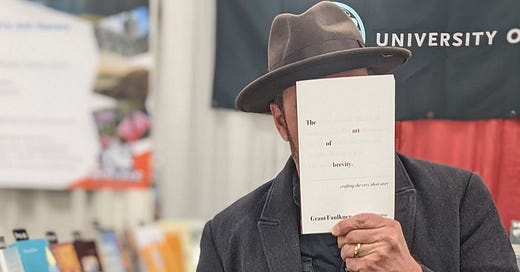Happy National Poetry Month!
I like to think of ways to recognize National Poetry Month each year because of the role poetry has played in my life as a writer. I’m always surprised when I hear a prose writer say they don’t read poetry—or, worse, that they don’t understand it—because I think our writing is at its best when it reaches for the poetic (which is why I wrote Poetry for Prose Writers last year at this time).
I’m always reading a collection of poetry alongside my other reading. This year—my year to revive deep reading—I decided to not only read T.S. Eliot’s “The Waste Land” in honor of its 100th anniversary but to do a year-long study of it.
“The Waste Land” served as an odd and unpleasant introduction to poetry for me. My high school English teacher assigned it to us, but without any explanation. She didn’t say when it was written, and she didn’t tell us anything about Eliot or modernist literature or anything. I was simply dropped into its dreary and impenetrable text in order to check another item off of the curriculum. I didn’t know how to read it. I didn’t know how to understand it.
I’m still not sure if I know how to read it or understand it, but that’s the point: to sit alongside my teen self and feel the timbre of the world through Eliot’s odd music.
I read the poem in its entirety yesterday, and I plan to do so again today. I also bought the most intriguing study aid I’ve ever encountered: The Waste Land app. I can listen to Eliot and others read the poem (a welcome addition to my daily dog walk) and get all sorts of commentary. The app brings the poem to life in marvelous ways.
Yesterday, I encountered an interesting angle on the poem’s origin by Eliot: “To me it was only the relief of a personal and wholly insignificant grouse against life; it is just a piece of rhythmical grumbling.”
I appreciated that take because that is one way to read the poem. I also liked this perspective because a poem can come from unlikely places, places that don’t seem to hold any wonders of beauty—from a rant, a grudge, a slight, or a peeve.
It’s been a while since I’ve written a poem. I think I’ll explore my grouses against life today and see what sort of rhythmical grumblings I can muster.
I will confess that I have sometimes thought of April as a cruel month, much as Eliot did in his opening lines. That’s the case especially this April, when the source of life and renewal seems to elude us on personal and societal levels more than ever (so “The Waste Land” remains relevant):
April is the cruellest month, breeding Lilacs out of the dead land, mixing Memory and desire, stirring Dull roots with spring rain.
Perhaps one way to read this poem is not to think too much about what it means but to think about what it means to you.
“Genuine poetry can communicate before it is understood,” as Eliot said.
Because some quotes
“A poet is one who distills experience—strains experience. A poet looks—sees. Poets oblige themselves to see. Poetry is siren, prose is survey.”
—Gwendolyn Brooks
“Poetry addresses individuals in their most intimate, private, frightened, and elated moments. People turn to poetry in times of crisis because it comes closer than any other art form to addressing what cannot be said. In expressing the inexpressible poetry remains close to the origins of language.”
—W.S. Merwin
“Maybe poems are not to be read for their great answers, but for their great, more often than not unanswerable, questions.”
—Matthew Zapruder
Because a story is sometimes really a poem
Dulcet
Succotash. Rutabaga. Wonderful words. Absinthe. Diaphanous. Ingénue. Even pamplemousse. I can say these words over and over on a dreamy Saturday morning, as if caressing a lover’s breast. Lissome. Pastiche. Evanescent. Snails think of such words as they slither so slowly on their way, absorbing the sumptuous wafts of scents in the air. They feel each of their movements as lithe, graceful. Desuetude. Flaneur. Insouciance. Patina. Why don’t people think of snails as great lovers, masters of sensuality as they mellifluously dream of ratatouille, rushing in their way to find it? We should follow the ephemeral gossamer of their trail.
This is a 100-word story in my collection Fissures. To call it a story might be a reach. I was really just having fun with some of my favorite words. Which is one way to write poetry. So perhaps it’s better categorized as a prose poem.
Because The Art of Brevity
Please consider buying The Art of Brevity. Writers tell me they like it. You might say it’s my way of being a poet in this world. My little stories are my little prayers. I like to drop them into the world.
Because more about me
I am the executive director of National Novel Writing Month, the co-founder of 100 Word Story, and an Executive Producer of the upcoming TV show America’s Next Great Author. I am the author of a bunch of books and the co-host of the podcast Write-minded.
My essays on creative writing have appeared in The New York Times, Poets & Writers, Lit Hub, Writer’s Digest, and The Writer.
For more, go to grantfaulkner.com, or follow me on Twitter or Instagram.







I'd like to memorize Rilke’s First Elegy. Not sure my brain can handle it.
Thanks for reminding me it’s poetry month.
Nice project to read and reread The Wasteland! I have a friend who memorized Prufrock. So much music there in Eliot for those who listen.